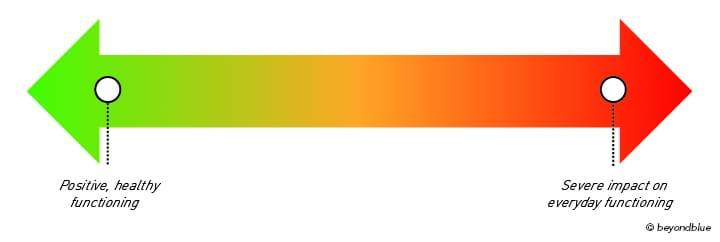WHAT IS GOOD MENTAL HEALTH?
It's an expression we use every day, so it might surprise you that the term 'mental health' is frequently misunderstood.
Mental health is often used as a substitute for mental health conditions - such as depression, anxiety conditions, schizophrenia, and others. But according to the World Health Organization, mental health is "a state of well-being in which every individual realises his or her own potential, can cope with the normal stresses of life, can work productively and fruitfully, and is able to make a contribution to her or his community." 1
To make things a bit clearer, some experts have tried coming up with different terms to explain the difference between 'mental health' and 'mental health conditions'.
Phrases such as 'good mental health', 'positive mental health', 'mental wellbeing', 'subjective wellbeing', and even 'happiness' have been proposed by various people to emphasise that mental health is about wellness rather than illness.
While some say this has been helpful, others argue that using more words to describe the same thing just adds to the confusion.
Rather than being about 'what's the problem?', it's really about 'what's going well?'.
People have also tried to explain the difference between mental health and mental health conditions by talking about a range or a continuum where mental health is at one end, represented by feeling good and functioning well, through to severe symptoms of mental health conditions at the other. Mental health is not fixed or in a static state, and we can move back and forth along this scale at different times during our lives.
At the green end of the continuum, people are well; showing resilience and high levels of wellbeing. Moving into the yellow area, people may start to have difficulty coping. In the orange area, people have more difficulty coping and symptoms may increase in severity and frequency. At the red end of the continuum, people are likely to be experiencing severe symptoms and may be at risk of self-harm or suicide.
It's important to remember that mental health is complex. The fact that someone is not experiencing a mental health condition doesn't necessarily mean their mental health is flourishing. Likewise, it's possible to be diagnosed with a mental health condition while feeling well in many aspects of life.
Ultimately, mental health is about being cognitively, emotionally and socially healthy - the way we think, feel and develop relationships - and not merely the absence of a mental health condition.
Source: Heads Up


